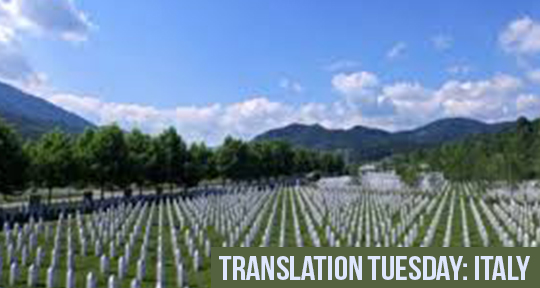In this week’s Translation Tuesday, two immigrants bare the wounds of their respective traumas in this excerpt from Elvira Mujčić’s novel On How to Be a Good Immigrant. Our narrator, a Bosnian immigrant haunted by the atrocities that robbed her of her family and her home, finds kinship with an immigrant from Mali, who opens up about the systemic racism he endures in Italy. Colarossi’s superb translation captures the subtleties of Mujčić’s prose: the uncomfortable silences, the hesitant divulgences, and the quiet pain that follows when the narrator’s emotional walls break down. A meditation on the myriad ways immigrants face trauma and are expected to appease Western stereotypes.
Chapter X
“Can you light a fire wherever you like in Italy?” asked Mele, a friend of my brother’s whom I had met the last time I was in Bosnia.
“What do you mean?” I asked surprised by the sudden turn the conversation had taken from the surreal dissertation on the non-existence of God of just a few minutes ago.
“I mean: can a man light a fire wherever he likes and cook lamb on a spit?”
“No, you can’t.”
“Well, life isn’t worth living in a country like that!”
Why did everything have to take a folkloristic hue, I wondered, annoyed and uncomfortable, like some sort of Austro-Hungarian elementary teacher sitting on an Oriental futon. I was going to meet Ismail when I remembered the incident. It was probably because of our last discussion and the African proverb with which we had greeted each other: “When you don’t know where you’re headed, remember where you came from.” You should have instructions on how to be a good immigrant when you go back to your homeland, I thought. And suddenly I realized that the longing I had felt for tens of years was gone, replaced with a renewed curiosity for that country’s present. But I only loved it if it was set in the past, because it couldn’t harm me from that distant place. My curiosity was not, however, light and untroubled: it was often laden with overwhelming sorrow and paralyzing fear. It was a visceral bond I could do absolutely nothing about, an incessant alternating of thoughts that went from the conviction that I had left something there that I absolutely needed to find, and the realization that what I was looking for was made of the same substance as fog. READ MORE…

